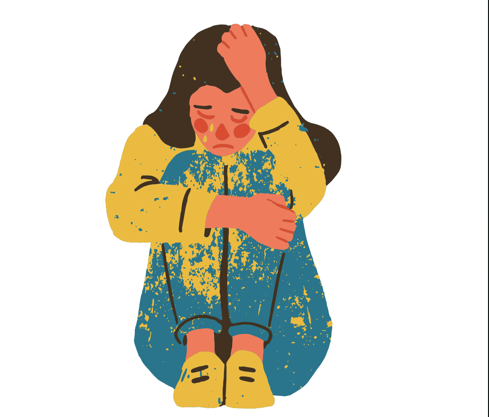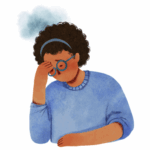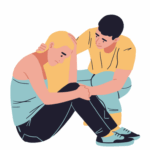Anxiety : More than Worry : A Constant Trigger
Anxiety is a complex emotional state which is a feeling of nervousness and persistent fear. Every human being feels things at different levels but anxiety can interfere in daily life. Worrying is normal. It helps us to stay on track and keep us on our toes but anxiety is the constant trigger which makes someone feeling anxious, it is a bit more intense, it is even hard to control and when someone has anxiety, it could turn into a bad mental health condition which affects every part of our daily life. Anxiety has become a common condition worldwide but it should be talked about more openly so that a person who has anxiety can get help.
Types of Anxiety
Anxiety can be categorized in many types, some general explanations are:
1. Generalized anxiety disorder
When a person has continuous worry or anxiousness about things which we have to deal with everyday like handling house chores, work, finances or even our relationship with friends and family. When worry is out of proportion or control.
2. Panic disorder
Intense episodes of fear and discomfort called panic attacks that reach at peak within minutes. Sudden, unexpected attacks with physical symptoms such as chest pain, rapid heart rate, sweating, and dizziness.
3. Social anxiety disorder
It is the fear of mingling in social situations like formal events, having parties with friends, family gatherings. It is a constant fear of being judged, criticism or embarrassment.
4. specific phobias
It is an instant fear or anxious response to a specific situation, object or activity like fear of spiders, lizards, heights, water etc.
5. Obsessive-Compulsive Disorder (OCD)
Having repeated or we can say unwanted obsessions like thoughts and behaviours can cause anxiety.
6. Post-Traumatic Stress Disorder (PTSD)
Having any past traumatic incidents and relieving those trauma can cause anxiety.
Causes of Anxiety
- Anxiety can occur through genetics and it can run in families.
- Anxiety can also happen due to some life experiences like some traumatic events and stress, also changes in life can trigger anxiety.
- Personality traits like low self- esteem, low confidence or fear of being judged can increase the risk of anxiety.
- Negative thinking can also lead to anxiety like thinking or expecting the worst case scenarios.
- Perfectionism can also trigger anxiety and a fear of failure could also trigger anxiety.
- Any kind of past abuse which got neglected could lead to anxiety.
- Sometimes stressful life events like losing a job, having a divorce or maybe illness could lead to anxiety.
- Chronic illness can also trigger anxiety.
- Having financial problems or unstable homes like having unforeseen circumstances can also trigger anxiety.
Symptoms of Anxiety
Anxiety not only affects the mind or behaviour it also impacts the body. Emotional symptoms are more often easily detected than physical symptoms. Having a fear that purses for a long time could be seen. There is always an on edge feeling that makes a person restless and irritable. Not able to control thoughts and having trouble thinking or concentrating on things which are important. Physical symptoms could also be seen like headache, having muscle tension, sleep difficulties, heart racing, shortness of breath, sweating more often. One could get stomach problems like nausea or diarrhoea. There could be difficulty in concentrating, a feeling of being blank in mind or over thinking things, constantly seeking reassurance.
How Anxiety Impacts Daily Life
Anxiety can come into a person’s life silently without even knowing. Sometimes a person does not even know that they are suffering from anxiety. Affecting our relationships with family and friends, there could be irritability or withdrawal with family friends, getting irritated in very normal situations or not being able to maintain relationships which used to be very close. Talking about school or work one can miss deadlines, having poor attention or even performing poorly.Anxiety definitely affects our health as it raises risk of heart diseases, digestive problems and even high blood pressure.Anxiety can destroy one’s self esteem, it destroys confidence which can makes an individual feel helpless.
Breaking Stigma
The big word “STIGMA” makes it difficult for individuals to talk about anxiety more openly which keeps their struggles hidden and also prevents them from seeking help. Being too sensitive or overreacting in situations is what is misunderstood by society. Sharing of recovery stories could also be a very good step for healing. When people who have already overcome this in society share their experiences it helps other people to deal with it in their own way and also help finding popping mechanisms or maybe encouragement for therapy and medication.
Recovery starts with a balanced lifestyle and having small wins, there should be no rush to get recovered but it is a slow process which takes time and patience of a person. If you know someone acting a bit different from what they used to be you should try to talk to them or help them in any possible way you can as a little ray of hope can help a person suffering from anxiety. Just spending time with a person who is having anxiety and just listening to them, there is no need to give solutions just sit and listen as this could also help a person dealing with anxiety. There is a need to stop telling people that they are not normal as it is out of their control to react to situations.
Conclusion
Anxiety is a pervasive wellness. It is most treatable. It is not a weakness, but while dealing with it gives strength to a person and comes back stronger as a human being. Getting support selfcare having medication going to therapy can help individuals control their anxiety and have a happy and healthy life. Having a balanced life is a purposeful step to recover from anxiety. Self help is a crucial for healing journey like regularly exercising which would lower are stress hormone, having a balanced diet, always being hydrate ,having a good sleep cycle like setting bedtime each night or no screens at night, trying meditation, yoga or deep breathing, journalling one’s perspective, having mini goals to achieve, trying to overthink less, spending time with friends and family, taking time for hobbies or any activities one like lastly being patient as recovery takes time.



